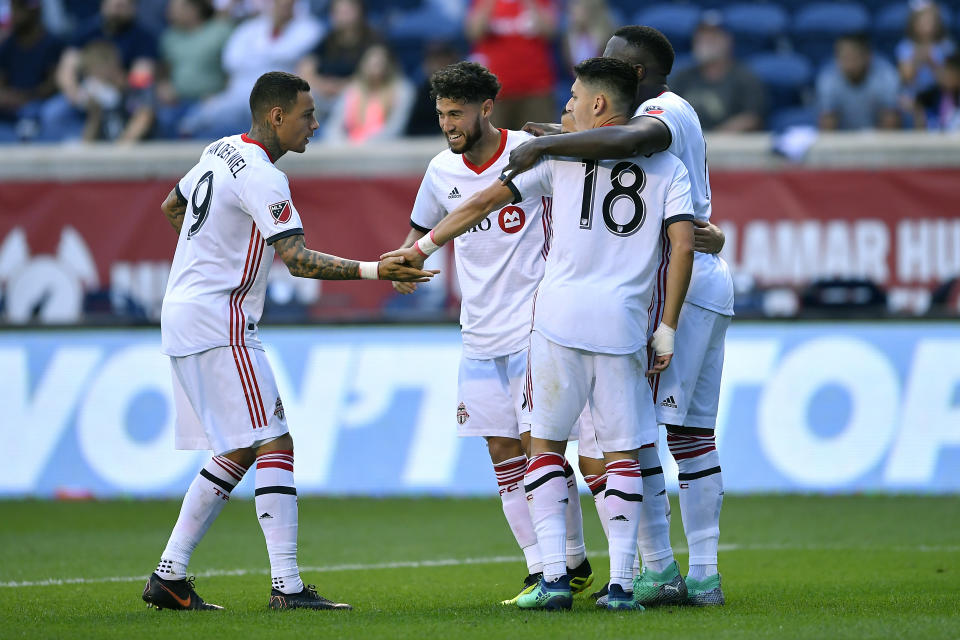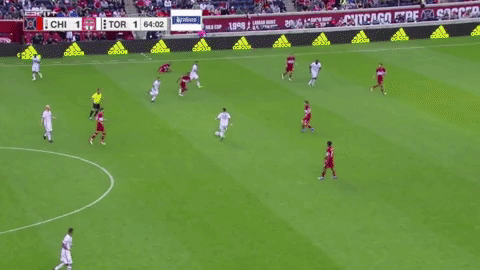Toronto FC and an impossible MLS dilemma: What to do when greatness disappears?

BRIDGEVIEW, Ill. — For the first time in a long time, the locker room speakers bumped not just any music; celebratory music. In the bowels of Toyota Park on Saturday, banter was cheerful. Smiles were unfettered.
Toronto FC, at the seventh attempt since June 8, had finally won an MLS game. A 2-1 victory over Chicago had snapped its longest barren run since 2013, when the club, in the words of GM Tim Bezbatchenko, was a “laughingstock.”
Five years later, it had become a model, a blueprint for competitors to copy. “Two and a half months ago, we were arguably the best team in CONCACAF,” head coach Greg Vanney noted Saturday. And yet suddenly, as spring bled into summer, they weren’t. Suddenly they were the joint-second-worst team in MLS. They had taken one point from five games.
MLS’ standard-bearer, in a matter of months, had become its biggest enigma, the most successful season in league history giving way to one of the strangest. The first-to-worst turn had evidently and admittedly provoked frustration. And it left the franchise facing an impossible question:
What do you do when greatness, without warning, disappears?
Toronto’s dilemma
It is difficult to overstate the contrast. In 2017, Toronto FC won a treble. Canadian Championship, Supporters’ Shield, MLS Cup. It broke a single-season league record for points. It averaged over two per match, and became the second MLS team to score twice as often as it conceded.
In 2018, heading into Saturday, it had taken 16 points from a possible 57. Calls for change were crescendoing. And panic buttons were at the ready.
The dilemma – to smash that panic button, or to stay the course – was a vexing one, because the list of ailments was so lengthy. On one hand, many of them were extenuating, fluky and temporary. An inspiring and prioritized run to the brink of CONCACAF Champions League glory had Toronto playing catchup in MLS after two months.
From there, injuries hit. Nineteen different players have played at least eight of TFC’s 20 MLS games. Jozy Altidore, Chris Mavinga and Drew Moor, all first-choice starters, aren’t among those 19. A roster that was supposedly MLS’ deepest ran head first into the limits of the league’s salary cap. Proverbial square pegs were jammed into round holes, on-field connections ruptured, rhythm interrupted. Performance dipped.
“The outside person could hardly even imagine the amount of variables that the group has encountered,” Vanney said Saturday.
The injury excuse naturally supported a compelling case for staying the course. But on the other hand, what if Michael Bradley, with his 31st birthday approaching, was no longer Il Generale? What if Sebastian Giovinco, with as many MLS penalty misses as open-play goals in his age-31 season, had careened into decline? What if Drew Moor, at 34, no longer had the mobility to fix an error-prone defense? What if that defense, without cemented structure around it, really was one of the league’s worst?
The impossibility of the situation, which has had Vanney and Bezbatchenko working around the clock recently, is that there’s no way to know the answers to those questions. No way to assess a group of players you haven’t seen together on a soccer field in months.
Underlying numbers – which Toronto uses extensively – indicate TFC hasn’t been all that bad, even with its makeshift 11s. It has underperformed Expected Goals at both ends of the pitch. Vanney, when asked about takeaways from the metrics, reiterates, “creating chances isn’t our problem.”
But he doesn’t subscribe to the theory that his team has been better than results suggest. “When you’re conceding a bunch of goals, it’s hard to say you deserve results,” he argues.
Instead, he subscribed to the theory that greatness would return when players did.
Altidore’s return
Saturday’s skid-snapping victory wasn’t just coincidental. Mavinga’s first appearance since May fortified Toronto’s back three. Altidore returned to an MLS field for the first time since March.
“Guys start to play in natural positions, relationships that have existed for a couple years start to come out again,” Vanney explained, describing the snowball effect, or rather the undoing of it, that will elevate TFC. Altidore, he said, consistently “holds up the ball for us, and brings the game forward. He also occupies a lot of attention, which gives Seba a little bit more space to work.”
Case in point: Saturday’s goals. Altidore’s mere presence left Giovinco isolated for the early-second-half opener.

Later, his run allowed Marky Delgado to slip in Jonathan Osorio for the winner.

Altidore, who had “only really trained two or three times” since foot surgery, was the first to admit his “timing wasn’t great.” But there were glimpses. Glimpses of his and Mavinga’s impact, and of a team transformed. Glimpses of the treble-winners.
“We still have a ways to go,” Vanney said. “It’s the first time that group has been on the field together in months. But we have another level we can hit as guys reach match fitness, as guys get a little more attuned and accustomed to each other.
“It’s not like we didn’t have quality on our roster,” he continued. “So we knew as we started to get guys back, in some ways, it would feel like our old team again.”
TFC’s stoicism and self-belief
An outgoing loan and a cap-space-clearing trade have given Bezbatchenko flexibility, and a corresponding move to enhance the roster is expected. But if the decision were between major shakeup and status quo, it’s pretty clear which TFC has chosen.
“New players aren’t always the solution,” Bezbatchenko told local media Thursday. “The dynamics and the way that the team is structured is as important to success as the new players and maybe the talent level.”
Two days later, Vanney echoed his boss: “When you start blowing things up and shifting guys around, you’re integrating guys who are trying to learn what you’re doing. So it doesn’t make sense. We have a good team. … Tonight was a sample of who we are.”
That, of course, is all it is for now. Toronto still finds itself in 10th place, and in a hole. And if it falls short of a playoff berth, its resisting of the temptation to make sweeping changes will be viewed as stubbornness; as a franchise clinging to the past.
But if it’s vindicated, it’s admirable defiance. It’s stoicism. It’s a meeting between adversity and calm that has become all but extinct elsewhere in modern soccer. It’s why TFC remain the standard-bearers.
“We’ve built the success over the past four to five years with stability, continuity as our drivers,” Bezbatchenko said. “We’re having a dip in form, in some confidence, with some injuries. That’s sort of a perfect storm. … We don’t need to rebuild. Everyone in this building still believes we can make the playoffs.”
The idea that TFC can’t – that a nine-point hole, with two games in hand and the season not yet two-thirds gone, is too deep – is absurd. Rarely do teams overturn 11-point deficits for meaningful prizes. But rarely is a league’s most talented squad competing with thoroughly mediocre ones. Such is the peerlessly forgiving nature of MLS.
That’s why TFC, despite a sub-1 point-per-game average, remains a contender. It’s likely one of the reasons the attitude in the locker room Saturday was so upbeat.
It’s probably not the reason a good-natured debate over postgame song choice landed on a Calvin Harris and Dua Lipa tune whose chorus begins, “One kiss is all it takes.” But it didn’t require too big a leap to land on the metaphorical (and coincidental) significance.
For Toronto, one game was all it took. All that was necessary to evoke last year’s excellence; to recognize the rationale behind staying the course; and to either spark or confirm belief.
“People are counting us out; we’re not,” Altidore assured a small group of reporters in that victorious locker room. “Believe it or not, we’re still alive.”
– – – – – – –
Henry Bushnell covers global soccer for Yahoo Sports. Have a tip? Question? Comment? Email him at henrydbushnell@gmail.com, or follow him on Twitter @HenryBushnell, and on Facebook.
More soccer on Yahoo Sports:
• Unpacking Mesut Ozil’s retirement from German national team
• Antonio Conte is suing Chelsea. Does he have a case?
• The 25 biggest transfers of the summer so far


